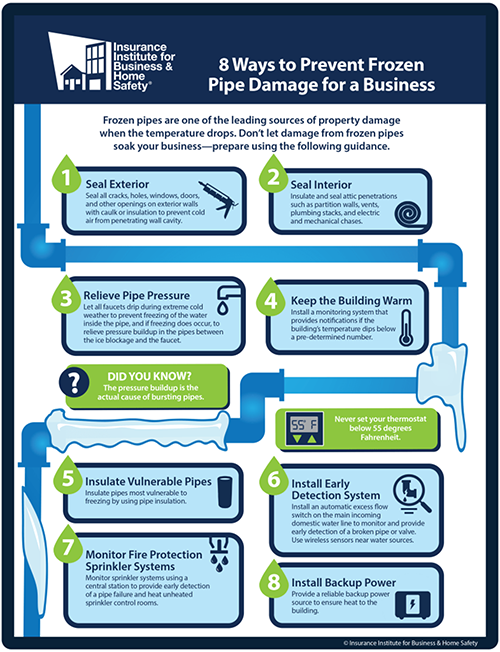8 Ways to Prevent Frozen Pipe Damage

The snow plows are on standby and the boiler is running, but are your pipes ready for the winter weather? As a business owner, it is imperative to properly prepare your pipes for freezing temperatures. Frozen pipes can hamper your access to water. Even worse, frozen pipes can burst,
potentially causing massive property damage. To protect your business from winter, follow these eight ways to prevent frozen pipe damage for a business; provided by the Insurance Institute for Business & Home Safety’s Prevent Frozen Pipes.
- Seal Exterior: Prevent cold air from penetrating wall cavity by using caulk or insulation to seal any exterior openings such as: cracks, holes, windows, and doors.
- Seal Interior: Prevent cold air from penetrating the attic by sealing and insulating: partition walls, vents, plumbing stacks, and electric and mechanical chases.
- Relieve Pipe Pressure: Have your faucets drip during extreme cold weather to prevent freezing. If freezing does occur, this will relieve pressure buildup in the pipes between the ice blockage and the faucet. Pressure buildup is the key cause of bursting pipes!
- Keep the Building Warm: Determine a temperature that will keep the building at an appropriate warmth, and install a monitoring system that provides notifications if the building falls below that chosen temperature. At the very least, never set the thermostat below 55 degrees Fahrenheit.
- Insulate Vulnerable Pipes: Use pipe insulation to protect your most vulnerable pipes from freezing.
- Install Early Detection Systems: Monitor and detect pipe or valve damage by installing an automatic excess flow switch on your main incoming domestic water line. Use wireless sensors near water sources.
- Monitor Fire Protection Sprinkler Systems: Using a central station, monitor your sprinkler systems for early detection of a pipe failure and unheated sprinkler control rooms.
- Install Backup Power: Ensure constant heat to the building by providing a reliable backup power source.
Reference: Insurance Institute for Business Home and Safety: Prevent Frozen Pipes
